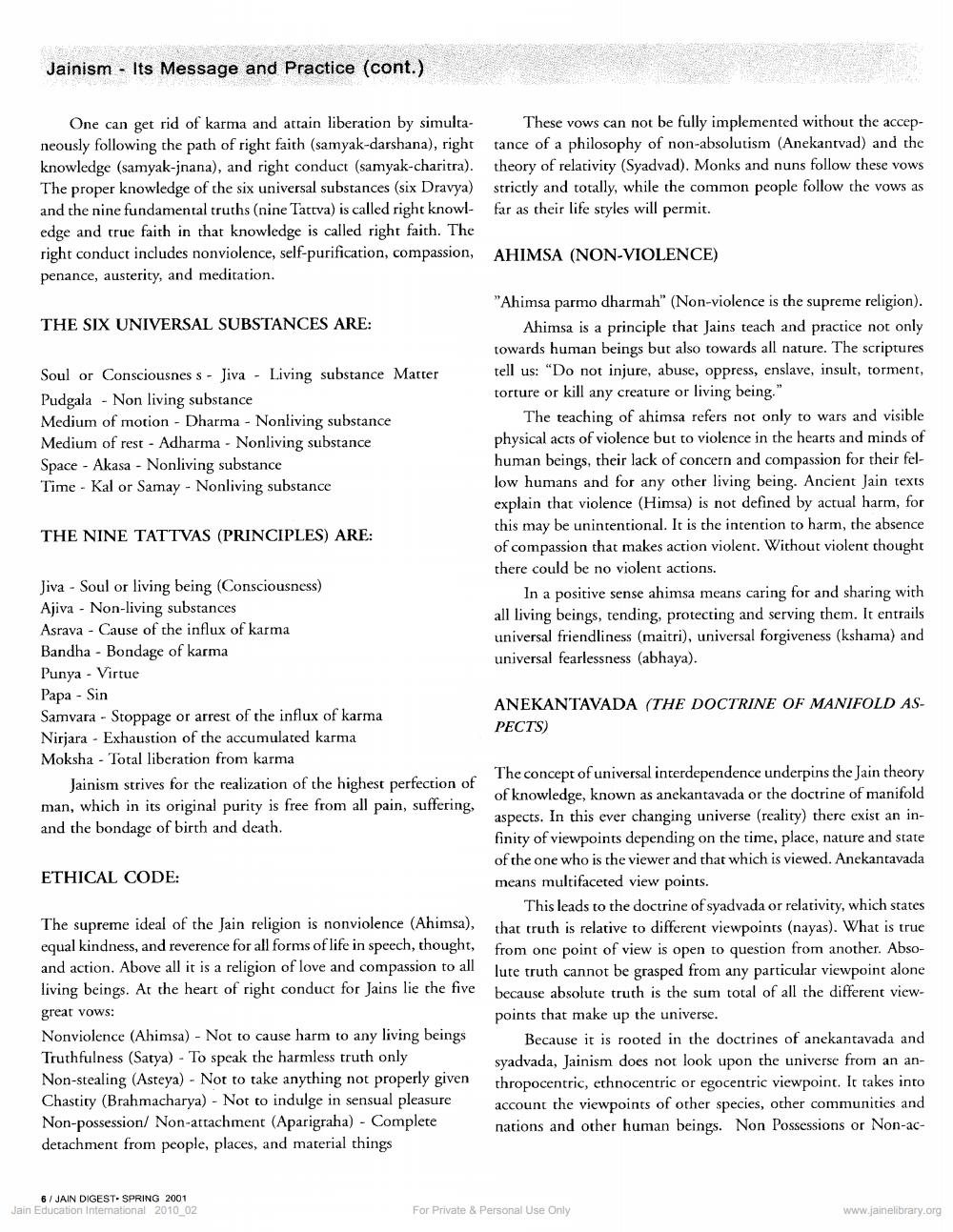Book Title: Jain Digest 2001 01 Vol 17 No 01 Author(s): Federation of JAINA Publisher: USA Federation of JAINA View full book textPage 8
________________ Jainism - Its Message and Practice (cont.) One can get rid of karma and attain liberation by simulta- These vows can not be fully implemented without the accepneously following the path of right faith (samyak-darshana), right tance of a philosophy of non-absolutism (Anekantvad) and the knowledge (samyak-jnana), and right conduct (samyak-charitra). theory of relativity (Syadvad), Monks and nuns follow these vows The proper knowledge of the six universal substances (six Dravya) strictly and totally, while the common people follow the vows as and the nine fundamental truths (nine Tattva) is called right knowl- far as their life styles will permit. edge and true faith in that knowledge is called right faith. The right conduct includes nonviolence, self-purification, compassion, AHIMSA (NON-VIOLENCE) penance, austerity, and meditation. "Ahimsa parmo dharmah" (Non-violence is the supreme religion). THE SIX UNIVERSAL SUBSTANCES ARE: Ahimsa is a principle that Jains teach and practice not only towards human beings but also towards all nature. The scriptures Soul or Consciousness - Jiva - Living substance Matter tell us: "Do not injure, abuse, oppress, enslave, insult, torment, Pudgala - Non living substance torture or kill any creature or living being." Medium of motion - Dharma - Nonliving substance The teaching of ahimsa refers not only to wars and visible Medium of rest - Adharma - Nonliving substance physical acts of violence but to violence in the hearts and minds of Space - Akasa - Nonliving substance human beings, their lack of concern and compassion for their felTime - Kal or Samay - Nonliving substance low humans and for any other living being. Ancient Jain texts explain that violence (Himsa) is not defined by actual harm, for this may be unintentional. It is the intention to harm, the absence THE NINE TATTVAS (PRINCIPLES) ARE: of compassion that makes action violent. Without violent thought there could be no violent actions. Jiva - Soul or living being (Consciousness) In a positive sense ahimsa means caring for and sharing with Ajiva - Non-living substances all living beings, tending, protecting and serving them. It entrails Asrava - Cause of the influx of karma universal friendliness (maitri), universal forgiveness (kshama) and Bandha - Bondage of karma universal fearlessness (abhaya). Punya - Virtue Papa - Sin ANEKANTAVADA (THE DOCTRINE OF MANIFOLD ASSamvara - Stoppage or arrest of the influx of karma PECTS) Nirjara - Exhaustion of the accumulated karma Moksha - Total liberation from karma The concept of universal interdependence underpins the Jain theory Jainism strives for the realization of the highest perfection of of knowledge, known as anekantavada or the doctrine of manifold man, which in its original purity is free from all pain, suffering, aspects. In this ever changing universe (reality) there exist an inand the bondage of birth and death. finity of viewpoints depending on the time, place, nature and state of the one who is the viewer and that which is viewed. Anekantavada ETHICAL CODE: means multifaceted view points. This leads to the doctrine of syadvada or relativity, which states The supreme ideal of the Jain religion is nonviolence (Ahimsa), that truth is relative to different viewpoints (nayas). What is true equal kindness, and reverence for all forms of life in speech, thought, from one point of view is open to question from another. Absoand action. Above all it is a religion of love and compassion to all lute truth cannot be grasped from any particular viewpoint alone living beings. At the heart of right conduct for Jains lie the five because absolute truth is the sum total of all the different viewgreat vows: points that make up the universe. Nonviolence (Ahimsa) - Not to cause harm to any living beings Because it is rooted in the doctrines of anekantavada and Truthfulness (Satya) - To speak the harmless truth only syadvada, Jainism does not look upon the universe from an anNon-stealing (Asteya) - Not to take anything not properly given thropocentric, ethnocentric or egocentric viewpoint. It takes into Chastity (Brahmacharya) - Not to indulge in sensual pleasure account the viewpoints of other species, other communities and Non-possession/ Non-attachment (Aparigraha) - Complete nations and other human beings. Non Possessions or Non-acdetachment from people, places, and material things 6/JAIN DIGEST- SPRING 2001 Jain Education International 2010_02 For Private & Personal Use Only www.jainelibrary.orgPage Navigation
1 ... 6 7 8 9 10 11 12 13 14 15 16 17 18 19 20 21 22 23 24 25 26 27 28 29 30 31 32 33 34 35 36 37 38 39 40 41 42 43 44 45 46 47 48 49 50 51 52 53 54 55 56
